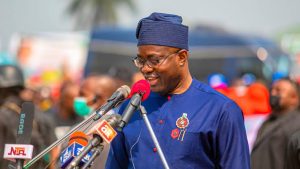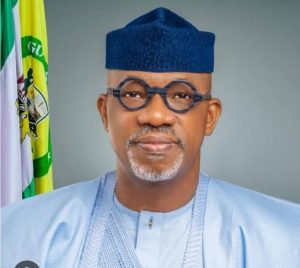
Electoral, Security, Economic Reforms, Our Priority – Speaker Abbas
…says Reps demonstrate maturity, remain united as House resumes plenary
The Speaker of the House of Representatives Rt. Hon. Abbas Tajudeen, PhD, has listed some of the priority legislation as the parliament resumed plenary on Tuesday after the lawmakers’ annual recess.
Speaker Abbas noted that the House will prioritise the ongoing review of the 1999 Constitution and the Electoral Act, while security and economic reforms will be at the forefront of legislative activities in the coming months.
The Speaker, in his welcome address to members of the House, noted that “responsibilities before us are substantial, and the progress we have made so far is meaningful but incomplete.”
Speaker Abbas also noted that the tasks ahead “are demanding but achievable,” stating that, “Nigerians will judge us not by party affiliations but by the results we deliver.”
He said: “In the coming months, our attention must turn to several urgent priorities. Chief among them is the constitutional amendment. Eighty-seven proposals concerning devolution of powers, local government autonomy, judicial reform, and socio-economic rights await debate and voting.”
Speaker Abbas recalled the national public hearing held on September 22, 2025, organised by the House Committee on Constitutional Amendment, which he said was “well-attended and highly successful, reflecting broad public interest and support.”
He stated: “We must now complete these votes and transmit the approved amendments to the State Assemblies before the end of December to enable early concurrence ahead of the election period.”
The Speaker also declared that the House must finalise electoral reforms well ahead of the 2027 general elections. “The Electoral Act Amendment Bill seeks not only to strengthen measures against violence, improve access for persons with disabilities, and establish clearer timelines for resolving disputes, but also to reduce the ambiguities that trailed the last elections,” he said.
Speaker Abbas added: “Our goal is to make elections less contentious and litigious, lower their cost through single-day voting, and make the process of party primaries more democratic and inclusive. Related constitutional changes include provisions for an Electoral Offences Commission. Our goal is to produce a new Electoral Act that stands the test of time.”
While noting that the Reserved Seats Bill for women is another major priority, the Speaker urged members to “support this historic step,” stressing that, “We are all HeForShe in advancing gender inclusion, and how we vote on this bill will shape how history and our daughters remember us.”
Speaker Abbas also noted that security reforms remain a top priority, while the debate on multi-level policing “must move from theory to decisive legislative action.”
He said though state police remains an option, “at the same time, we must strengthen community policing by revising the Police Act, 2020.”
While Section 19 establishes Community Policing Committees and Section 33(1) vests recruitment in the Inspector-General of Police, the Speaker pointed out that “these provisions centralise too much authority and limit local responsiveness.”
He said: “We should consider devolving recruitment, training, and deployment of community police officers to states under federal oversight. This would give states a greater role in shaping their security architecture while preserving national standards and coordination.”
Speaker Abbas also stated that economic recovery and job creation “must stay at the core of our agenda.”
He said: “We must utilise legislative measures to speed up the implementation of the Start-up Act, vocational training hubs, and technology parks. Equally important is progressive legislation to promote renewable energy, enhance grid reliability, and attract private investment to stabilise power supply and stimulate growth.”
He said: “The Nigerian people look to us for more; they expect deliberate action that improves their daily lives. The Renewed Hope government of President Bola Ahmed Tinubu has pursued reforms to stabilise the economy, enhance security, and attract investment.
“These efforts require a legislature that provides rigorous oversight, crafts sound laws, and engages constructively with all arms of government.”
Speaker Abbas emphasised that the 10th House has been “the most productive since 1999, both in terms of legislative outputs and outcomes” based on its midterm assessment. He added that despite political and economic challenges, “we have strengthened internal capacity, updated our rules, and expanded citizen participation.”
He emphasised that the chamber has fostered public engagement through these Open Weeks, town halls, media briefings, and the utilisation of digital and new media tools.
He said: “Between June 2023 and mid-2025, the House considered 2,263 bills, passed 237, and secured presidential assent for 50, covering power reform, student loans, cybersecurity, tax policy, and regional development. Our oversight is becoming more rigorous, with ongoing investigations and financial recoveries.
“Crucially, constructive collaboration with the Executive has enabled timely budgets, aligned reforms and effective policy outcomes, all while preserving the legislature’s independence and demonstrating that shared goals deliver more than conflict.”
Speaker Abbas noted that national indicators showed cautious optimism during the recession, with the headline inflation decreasing for a fifth consecutive month to 20.12 per cent, and food inflation also eased.
He also noted that diplomatic measures restored United Arab Emirates (UAE) visa services and Emirates Airlines flights, reopening avenues for trade and travel.
“Our security agencies have disrupted insurgent networks and rescued abducted citizens. While progress has been made, Nigerians still experience high living costs, underemployment, and insecurity in some areas. These challenges present opportunities for us to implement targeted legislative actions and foster ongoing engagement to create a brighter future for all,” he said.
The Speaker noted that the members spent the recess with their constituents, listening to their concerns and aspirations. “These interactions are the essence of representation and provide the insight we need to make informed legislative decisions. They reveal the real struggles and expectations of citizens who depend on this House to respond effectively to their needs,” he noted.
The Speaker stated that he “deeply appreciates the unity of this House” and the “overwhelming support” that members have shown in advancing their shared mandate.
“The 10th House has demonstrated remarkable maturity in managing differences and has earned a reputation for stability and responsible leadership. We have maintained cohesion in a diverse chamber through inclusive decision-making, transparency in managing House affairs, effective parliamentary diplomacy, and careful floor management.
“I urge us to remain united and to continue addressing any issues that arise through dialogue, ensuring that the House stays strong and focused on delivering for the Nigerian people,” he said.




























Average Rating